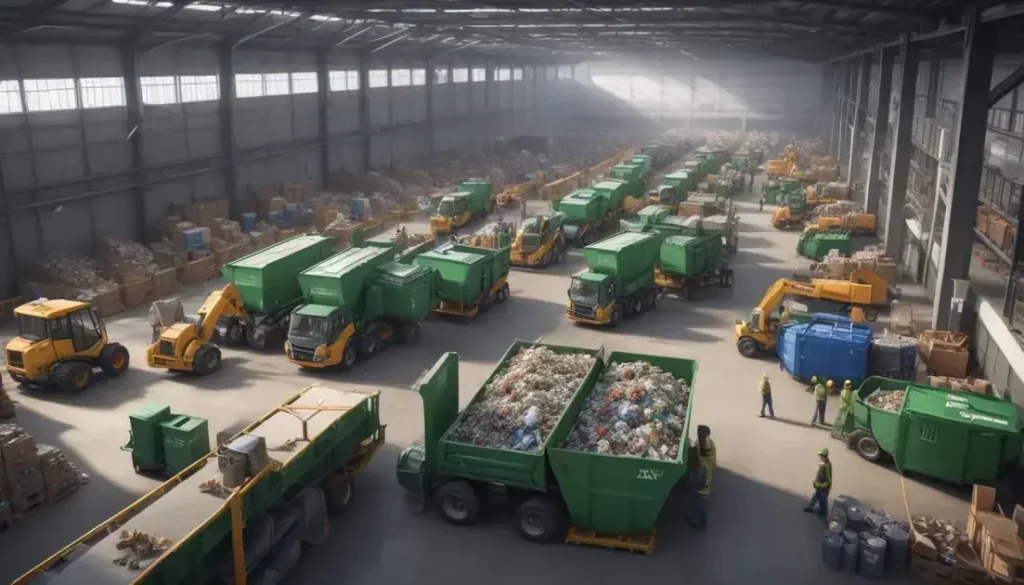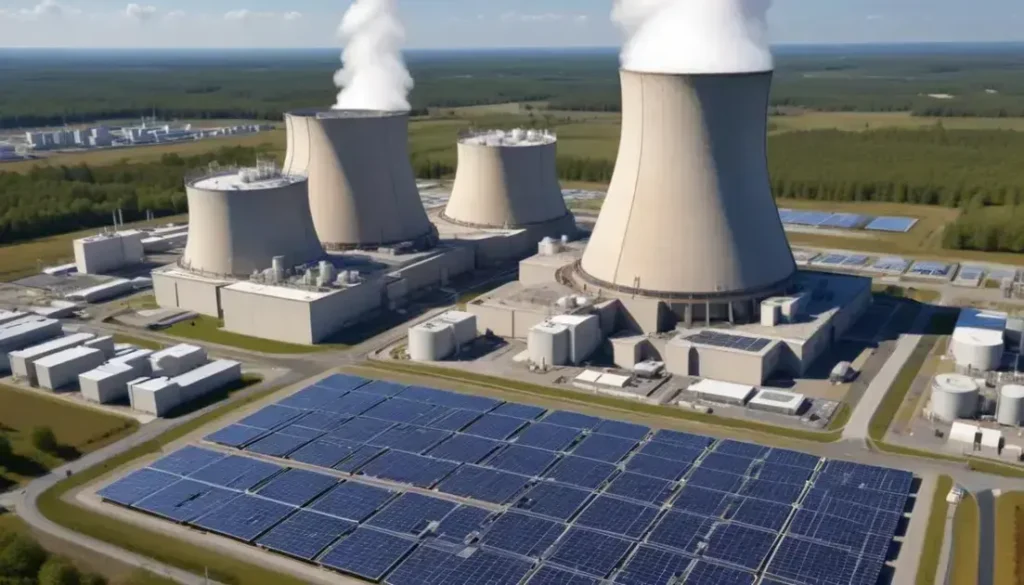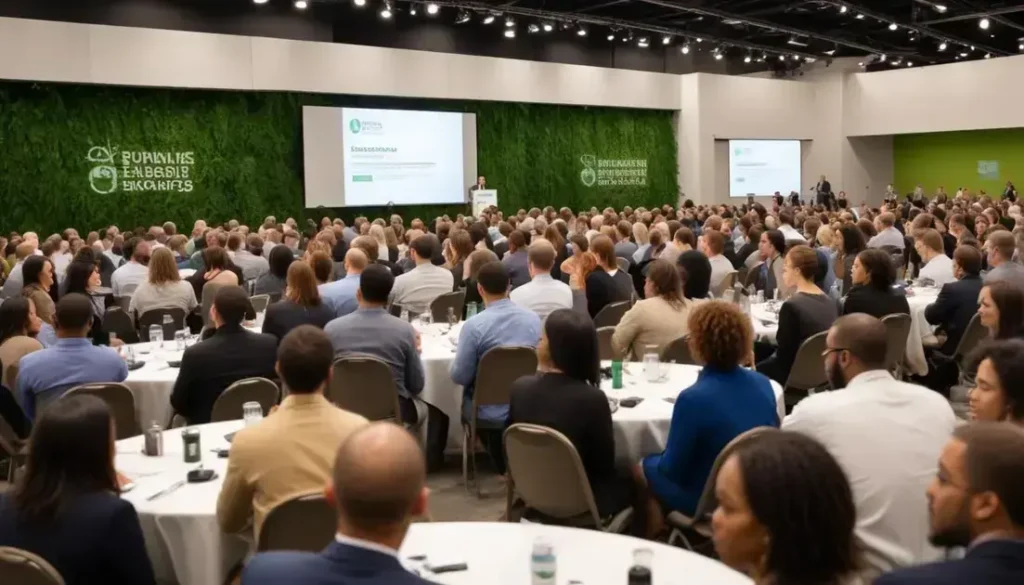The new recycling plant enhances sustainability by transforming waste into reusable resources, creating job opportunities, and promoting community engagement, thereby supporting the circular economy and aligning with rising consumer demand for eco-friendly practices.
Have you ever wondered how innovative recycling efforts can transform economies? Ingka Investments’ latest facility aims to do just that, impacting businesses across Canada.
Introduction to Ingka Investments
Ingka Investments plays a crucial role in enhancing sustainability efforts globally. As the investment arm of the Ingka Group, it focuses on innovative projects that drive both growth and environmental responsibility. The organization is committed to investing in renewable energy, sustainable transportation, and efficient resource management.
Commitment to Sustainability: Ingka Investments prioritizes initiatives that align with its sustainability goals. This includes developing new recycling infrastructure which not only reduces waste but also creates job opportunities in local communities. The collaborative efforts with different stakeholders further strengthen its mission.
By investing in a recycling plant, Ingka aims to transform waste management in Canada, ensuring that materials are reused and recycled effectively. This initiative is essential in promoting the circular economy, reducing reliance on virgin resources and minimizing environmental impact. Furthermore, such projects prepare Canadian businesses to adapt to increasingly stringent regulatory environments, fostering compliance and innovation.
Ingka Investments emphasizes transparency in its operations, providing stakeholders with insights into its sustainability practices. By highlighting the economic and environmental benefits of its projects, it aims to inspire other corporations to adopt similar practices, creating a ripple effect in the business community.
Significance of the new recycling plant
The new recycling plant introduced by Ingka Investments is a game-changer for environmental sustainability in Canada. This facility signifies a commitment to reducing waste and conserving resources. By enabling effective recycling processes, the plant aims to decrease the amount of waste that ends up in landfills.
Economic Impact: Beyond its environmental benefits, the plant will create numerous job opportunities within the local community, boosting the economy. This aligns with Canada’s goals to transition toward a greener economy while supporting workforce development. Companies involved in recycling and materials recovery can strengthen their operations, driving growth in the sector.
The facility will use innovative technologies and methodologies to enhance recycling efficiency, ensuring that materials are processed effectively. By adopting advanced sorting and processing techniques, the plant can maximize resource recovery, supporting the circular economy framework. This is crucial for businesses aiming to comply with strict environmental regulations.
Ingka’s initiative also speaks to the need for cooperation among various stakeholders, including governments, non-profits, and private enterprises. The plant sets an example for sustainable practices in Canada, motivating other businesses to prioritize sustainability. The significance of this recycling plant extends beyond its immediate operations, as it fosters a culture of environmental responsibility and innovation.
Impact on local economies
The establishment of the new recycling plant is set to have a profound impact on local economies. This facility will not only address waste management challenges but also create numerous job opportunities, promoting economic growth in the region. The jobs span various roles, from operational staff to specialized positions in waste processing technology.
Job Creation: The plant is expected to generate employment for hundreds of individuals directly. Indirectly, it will stimulate local businesses, such as suppliers and service providers. The influx of jobs will help to support families and contribute to a more robust local economy.
Furthermore, as the recycling plant enhances environmental sustainability, it fosters a community ethos of environmental responsibility. This shift encourages more businesses to adopt sustainable practices, which in turn can attract eco-conscious consumers and investors.
Moreover, the presence of a state-of-the-art recycling facility can lead to increased property values in the vicinity. A sustainable reputation can make the area more appealing to potential residents and businesses alike. As communities become more invested in sustainability, they may see long-term benefits through increased economic stability and growth.
Growth in recycling infrastructure
The growth in recycling infrastructure represents a significant advancement in sustainable practices. This new recycling plant is a testament to the commitment to enhancing the overall recycling capacity in Canada. By deploying advanced technologies, the facility aims to efficiently process a wider variety of materials, increasing the overall recycling rate.
Technological Innovations: The integration of modern sorting systems and automation will enable the plant to handle more complex recycling streams. This is crucial as it helps recover valuable resources from waste materials, turning them back into useable products. Furthermore, these innovations pave the way for higher quality recyclables, making them more attractive to manufacturers looking to reduce their environmental footprint.
As the recycling infrastructure expands, local communities can expect enhancements in both environmental and economic metrics. Cities can reduce their landfill reliance, leading to improved air and soil quality while also generating energy from waste materials. This shift not only promotes sustainability but also contributes to a circular economy, where resources are continuously reused.
In addition, the establishment of such plants often leads to increased public awareness around recycling and sustainability efforts. Educational programs and community initiatives can flourish, further embedding recycling in community practices, thus fostering a culture of environmental responsibility.
Insights from Ingka’s sustainability strategy
Ingka’s sustainability strategy is built on a vision of creating a positive impact on the planet while fostering economic growth. At its core, the strategy focuses on reducing the environmental footprint across all operations. This approach includes enhancing energy efficiency, minimizing waste, and promoting the use of renewable resources.
Key Initiatives: One notable initiative is the commitment to sustainable sourcing. Ingka prioritizes materials that are recycled or sustainably produced, ensuring that their supply chain supports environmental goals. Additionally, the company invests in innovation to develop new technologies that optimize resource use and reduce waste.
Ingka’s methods also encourage a culture of sustainability. By working closely with customers and communities, the company promotes awareness and participation in eco-friendly practices. Educational programs aim to inform consumers about recycling and the importance of sustainable living.
Through collaboration with various stakeholders, including local governments and non-profit organizations, Ingka seeks to create a more sustainable future. This collective effort strengthens their business model while positively impacting local environments. As more businesses adopt similar strategies, the momentum towards sustainability grows, paving the way for a healthier planet.
Collaboration with EU regulations
The collaboration with EU regulations plays a significant role in shaping Ingka’s sustainability initiatives. By aligning with stringent European environmental standards, Ingka ensures that its practices not only comply with current regulations but also set a benchmark for sustainability in the industry. This proactive approach bolsters the company’s reputation as a leader in environmental responsibility.
Regulatory Framework: The partnership with EU regulatory bodies allows Ingka to participate in the formulation of policies that promote recycling and waste reduction. Engaging with these regulations provides valuable insights that inform their operational strategies. Moreover, these collaborations facilitate access to funding and resources aimed at driving innovation in sustainable practices.
Additionally, adherence to EU directives encourages transparency and accountability in Ingka’s operations. By communicating their compliance journey, Ingka builds trust with stakeholders and consumers who are increasingly prioritizing sustainability in their purchasing decisions. This aspect not only enhances brand loyalty but also positions the company favorably in the competitive landscape.
Through collaboration with EU regulations, Ingka can leverage best practices from across Europe, ensuring that their sustainability initiatives are effective and impactful. This synergy fosters a culture of continuous improvement, motivating the company to set even higher sustainability targets.
Technological advancements in recycling
Technological advancements in recycling are revolutionizing how waste is managed and materials are recovered. The integration of state-of-the-art machinery and software systems has significantly improved the efficiency of recycling processes. Modern sorting technologies use advanced algorithms and sensors to accurately separate different types of materials, enhancing recovery rates and reducing contamination.
Innovation in Processing: New technologies, such as robotic arms and AI-assisted sorting systems, allow for precise handling of recyclables. These innovations streamline operations and minimize the need for manual labor, resulting in faster processing times. This not only increases the volume of materials recycled but also ensures higher quality inputs for manufacturers.
Furthermore, advancements in recycling technology are paving the way for new methods of recycling complex materials, such as composites and multi-layer packaging. These materials, once deemed difficult to recycle, can now be processed efficiently, contributing to a circular economy. This shift helps companies comply with evolving regulations aimed at reducing landfill waste.
As these technological advancements continue to evolve, they create opportunities for better sustainability practices across industries. By investing in innovative solutions, companies can not only improve their operational efficiency but also enhance their commitment to environmental stewardship.
Benefits for Canadian manufacturers
The new recycling plant brings numerous benefits for Canadian manufacturers, enhancing their ability to source sustainable materials. By providing access to high-quality recycled inputs, this facility enables manufacturers to reduce reliance on virgin resources. This shift not only conserves energy but also minimizes environmental impact.
Cost Efficiency: Utilizing recycled materials can lead to significant cost savings for manufacturers. As the prices of raw materials fluctuate, having a reliable source of affordable recycled materials can stabilize production costs. This economic advantage is essential in maintaining competitiveness in a global market.
Moreover, embracing recycling aligns with the growing consumer demand for sustainable practices. Manufacturers who utilize recycled inputs can market their products as environmentally friendly, appealing to eco-conscious consumers. This shift enhances brand loyalty and opens up new market opportunities.
Additionally, the plant supports compliance with increasingly stringent environmental regulations. By sourcing recycled materials, manufacturers can demonstrate their commitment to sustainability, positioning themselves favorably with regulators and stakeholders. This proactive approach not only meets compliance requirements but also fosters a positive corporate image.
In summary, the collaboration between the recycling plant and Canadian manufacturers is instrumental in driving economic and environmental benefits. As manufacturers adapt to these changes, they will contribute to a more sustainable and resilient economy.
Future of circular economy initiatives
The future of circular economy initiatives is increasingly promising, as organizations and governments recognize the urgent need for sustainable practices. A circular economy aims to eliminate waste by continuously reusing resources, which aligns well with the goals of the new recycling plant. This facility plays a vital role in promoting a circular economy by transforming waste materials into valuable resources.
Holistic Approaches: Future initiatives will focus on integrating various sectors, including manufacturing, retail, and communities, to create closed-loop systems. By collaborating across industry boundaries, organizations can innovate and share best practices, maximizing resource efficiency and minimizing waste generation.
Investment in research and development will also be crucial for advancing circular economy practices. Emerging technologies, such as bioengineering and advanced materials science, will facilitate the design of products that are easier to recycle and use renewable materials. Such advancements can significantly reduce our reliance on finite resources.
Furthermore, consumer awareness and preferences are shifting towards sustainability. As individuals increasingly embrace eco-friendly practices, businesses that adopt circular economy strategies can better meet market demands. This progressive mindset will lead to a more resilient economy, where environmental and economic interests align harmoniously.
Community engagement and job creation
Community engagement plays a vital role in the success of recycling initiatives and has a direct impact on job creation. As the new recycling plant becomes operational, it fosters local involvement by encouraging residents to participate in sustainable practices. This creates a sense of ownership and responsibility towards the environment.
Job Opportunities: The plant will create a variety of job roles, from operational positions to management and educational roles. As the facility processes more materials, the demand for skilled workers will increase. This opens doors for training programs that empower community members with the skills needed for employment in the green economy.
Moreover, engaging the community helps raise awareness about recycling and sustainability. Educational workshops and initiatives can inform residents about the importance of waste reduction and responsible disposal methods. By involving community members in these programs, the plant can cultivate a culture of sustainability that transcends beyond its operations.
As residents take part in events like cleanup drives or recycling campaigns, they develop a deeper connection to their local environment. This involvement not only strengthens community bonds but also inspires further action toward sustainability. In turn, as job opportunities expand, local economies will benefit, leading to a positive feedback loop that enhances both employment and environmental well-being.
In Conclusion: Embracing a Sustainable Future
The establishment of the new recycling plant marks a significant step towards a more sustainable future for communities and businesses alike. By emphasizing community engagement and job creation, this initiative not only contributes to environmental health but also strengthens local economies through new employment opportunities.
As technological advancements in recycling continue to evolve, they will provide meaningful benefits for Canadian manufacturers and the overall economy. The collaboration with EU regulations further ensures that these practices align with global sustainability goals.
Ultimately, the success of the circular economy depends on collective efforts from all stakeholders, including organizations, governments, and community members. By working together, we can create a cleaner, greener, and more resilient future, showing that economic growth and environmental responsibility can go hand in hand.
Frequently Asked Questions (FAQ)
How does the new recycling plant benefit the community?
The new recycling plant encourages community engagement by providing job opportunities, raising awareness about sustainability, and fostering a sense of ownership in local environmental initiatives.
What types of jobs will be created by the recycling plant?
The recycling plant will generate various job roles, including operational staff, management positions, and educational roles aimed at promoting sustainability practices in the community.
How does the recycling plant contribute to the circular economy?
By transforming waste materials into reusable resources, the recycling plant supports a circular economy that minimizes waste and encourages the continuous reuse of materials.
What technologies are used in the recycling process?
The recycling plant implements advanced sorting technologies, automation, and innovative processing methods to enhance efficiency and ensure high-quality recycled materials.
How can local businesses benefit from the recycling initiatives?
Local businesses can access high-quality recycled materials, which can reduce production costs, enhance sustainability efforts, and meet growing consumer demand for eco-friendly products.
What role does community engagement play in sustainability?
Community engagement is essential for building awareness and fostering participation in recycling initiatives, leading to stronger local networks and a collective commitment to environmental stewardship.


